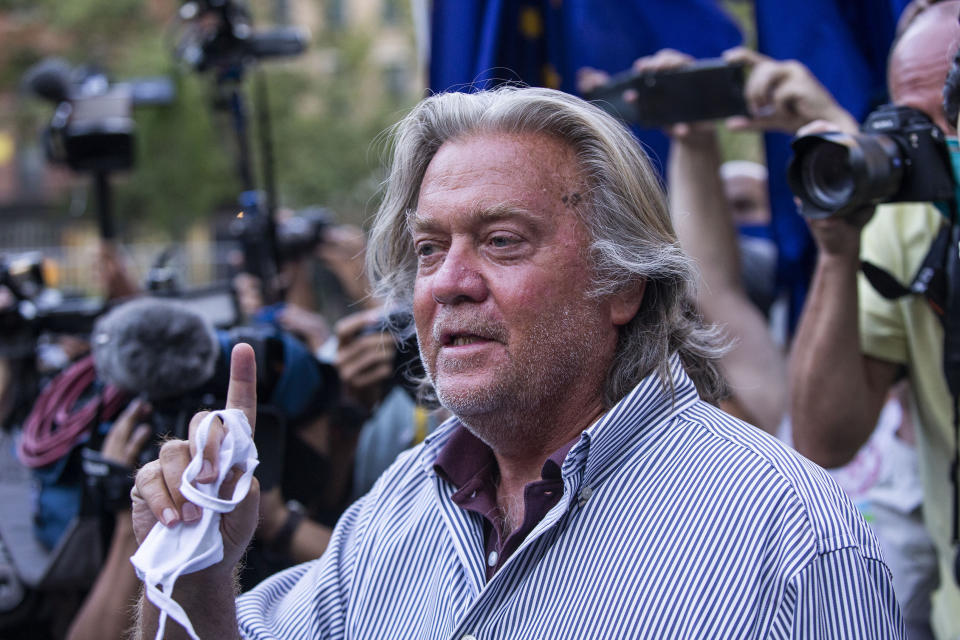Bannon calls his arrest a 'political hit job' aimed at intimidating Trump wall supporters
A day after his arrest on federal fraud charges related to a crowdfunding campaign to build a private border fence, former White House chief strategist Steve Bannon on Friday dismissed the case as a “total political hit job” engineered to “intimidate” supporters of President Trump’s promise to build a wall along the United States border with Mexico.
Bannon, who pleaded not guilty to the charges in U.S. District Court in Manhattan, was freed on $5 million bond and is back in Washington, D.C., delivering his daily “War Room” radio show and podcast.
“All of these charges are nonsense,” Bannon said. “This was to stop and intimidate people that want to talk about the wall. This was to stop and intimidate people that have President Trump’s back on building the wall.”

Bannon and three others — Brian Kolfage, Andrew Badolato and Timothy Shea — were charged with defrauding donors to their crowdfunding We Build the Wall campaign, which raised $25 million to privately supplement Trump’s plan to build a fence along the southern border.
Kolfage, a disabled Air Force veteran, repeatedly assured donors that he would “not take a penny in salary or compensation” and that “100% of the funds raised ... will be used in the execution of our mission and purpose” to build a border wall.
But prosecutors allege that all four men “received hundreds of thousands of dollars in donor funds from We Build the Wall, which they each used in a manner inconsistent with the organization’s public representations.”
Specifically, the 24-page indictment unsealed Thursday alleges that Kolfage “covertly took for his personal use more than $350,000 in funds that donors had given to We Build the Wall” to fund his “lavish lifestyle,” while Bannon received over $1 million through another unnamed nonprofit under his control, “at least some of which” was used to pay for hundreds of thousands of dollars in his personal expenses.
Bannon, 66, was arrested on a 150-foot yacht belonging to fugitive Chinese billionaire Guo Wengui off the coast of Connecticut.
“This fiasco yesterday was to intimidate anybody that wants to talk about American sovereignty and wants to talk about the wall,” Bannon said on the podcast. “We’re never going to stop talking about it and fighting for it.”
Bannon invoked his reputation as a “honey badger,” a weasel-like animal native to Africa and Asia known for its ferocity.
“Everybody knows I love a fight,” he said. “I’m in this for the long haul. I’m in this for the fight.”

Speaking to reporters at the White House on Thursday, Trump said he felt “very badly” for Bannon but knew “nothing about” the We Build the Wall project.
“When I read about it, I didn’t like it,” Trump said. “This is for government. This isn’t for private people. And it sounded, to me, like showboating.”
Bannon said he agreed.
“President Trump’s right, building the wall is a government function,” he said. “We’ve never questioned that at all.”
But he also suggested that the government can’t build it alone.
“Look how much trouble President Trump has had, what he’s had to fight against,” Bannon said. “And not just progressive Democrats but people in his own party.”
Bannon, who served as Trump’s top campaign adviser, lasted just seven months in the White House as the administration’s chief strategist.
He resigned in August 2017, less than a week after the deadly white supremacist rally in Charlottesville, Va., where neo-Nazis clashed with counterprotesters.
Bannon — who ran the Breitbart website and once called it a “platform for the alt-right” — reportedly advised Trump on his controversial response to the protests, when the president said there were “very fine people on both sides.”
___
Read more from Yahoo News:



